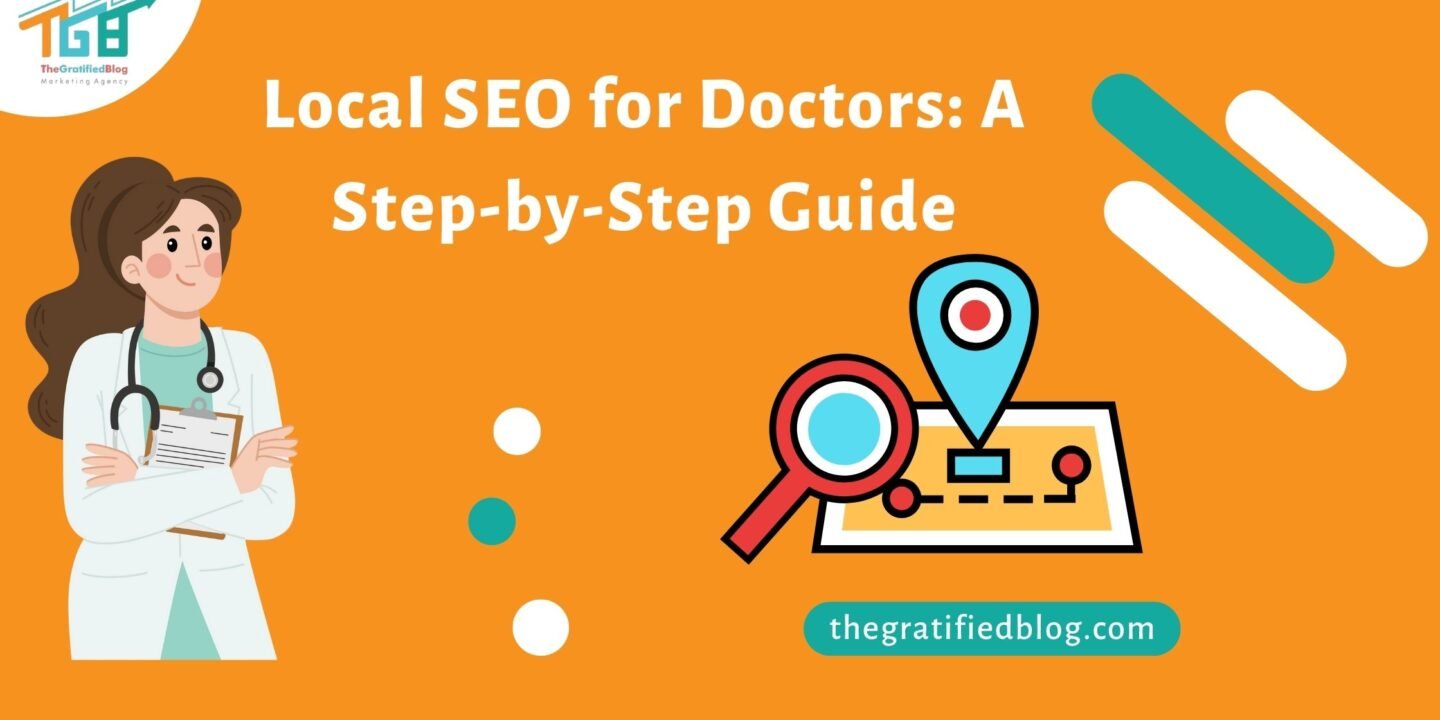
In today’s digital age, the success of any medical practice hinges not only on exceptional patient care but also on its online presence. As more and more patients turn to the internet to find healthcare providers, mastering the art of Local SEO (Search Engine Optimization) has grown significantly—a critical endeavor for doctors and medical professionals.
Imagine a scenario where a potential patient in your local area searches for “family physician near me” or “best pediatrician in [your city].” Will your medical practice appear at the top of the search results, facilitating them to find and choose you? This is where local SEO comes into play, ensuring your practice shines brightly in the digital landscape.
This comprehensive guide will delve deep into local SEO for doctors, unraveling the strategies and techniques that can propel your medical practice to the forefront of local search results. Whether you’re a solo practitioner, part of a group practice, or managing a healthcare facility, This guide will provide you with the information and tools needed to harness the immense power of local SEO.
What Is Local SEO?
Local SEO is refining your website and online presence to enhance visibility in local search results. For doctors, it’s about ensuring that your medical practice is prominently displayed when potential patients search for healthcare services in your geographical area.
Critical Components Of Local SEO
Local SEO is a specialized segment of search engine optimization dedicated to enhancing a business’s visibility in local search results. Critical components of local SEO include:
- Google My Business (GMB) Optimization:
- Claiming and verifying your GMB listing
- Ensuring accurate NAP (name, address, phone number) information.
- Selecting the appropriate categories and attributes for your business
- Uploading high-quality photos and videos.
- Managing and responding to customer reviews
- Posting updates and promotions through the GMB platform.
- On-Page SEO:
- Incorporating location-specific keywords naturally into your website’s content, meta tags, and headings
- Creating individual landing pages for different locations you serve
- Structuring content to answer common local queries.
- Optimizing images and other media with relevant alt text and location tags
- Ensuring mobile friendliness and fast page loading times, as these factors influence local search rankings.
- Off-page optimization:
- They acquire high-quality backlinks from local websites, directories, and authoritative sources.
- They are building relationships with local businesses and organizations for potential link opportunities.
- Guest posting or contributing content to local blogs or news outlets.
- We are encouraging local news coverage and mentions.
Why Local SEO For Doctors Is Crucial?
Local SEO for doctors is critical to a healthcare practice’s digital marketing strategy. This specific search engine optimization method is essential for healthcare professionals looking to connect with local patients in their geographic area. Here are some reasons:
- Visibility: Local SEO helps doctors and medical practices rise to the top of search results, boosting their visibility to potential patients.
- Trust and Credibility: High-ranking search results convey trust and credibility, which are essential for healthcare providers.
- Competitive Advantage: Effective local SEO strategies can help doctors outshine competitors in the same area.
- Increased Patient Base: By reaching a wider audience online, doctors can attract more patients to their practice.
Also Read: Why Local SEO For Dentists is Important?
How Can Doctors Optimize Their GMB Profile To Improve Their Local Search Visibility?
Optimizing a Google business profile is crucial for doctors looking to enhance their local search visibility. Here are the steps they can take to achieve this:
Google My Business (GMB) Optimization
Google My Business (GMB) optimization is crucial for doctors and medical practices looking to improve their online visibility in local search results.

Here are steps and tips to optimize your GMB profile effectively:
- Claim and Verify Your Listing:
- If you still need to, claim and verify your GMB listing. This process typically involves receiving a verification postcard or phone call from Google to confirm your business’s authenticity.
- Complete Your Profile:
- Fill out all the correct information about you in your GMB profile completely. This includes your practice name, address, phone number (NAP), website URL, business hours, and categories.
- Maintain coherence between the details in your GMB profile and your website.
- Choose the Right Categories:
- Choose the most fitting primary and secondary categories for your medical practice. This helps Google understand your specialty and the services you offer.
- Write a Compelling Business Description:
- Craft a concise and informative business description highlighting your medical expertise, services, and what sets your practice apart. Use keywords naturally, but avoid keyword stuffing.
- Add High-Quality Photos and Videos:
- Upload professional photos of your clinic, staff, and medical facilities. Visual content helps potential patients get a sense of your practice.
- Consider adding videos that showcase your services or provide helpful health tips.
- Encourage Reviews:
- Encourage content patients to share their reviews on your GMB profile. Positive reviews can significantly influence potential patients’ decisions.
- Reply promptly and professionally to all reviews, whether positive or negative. Engaging with reviews demonstrates your commitment to patient satisfaction.
- Post Regularly:
- Use the Google Posts feature to share updates, promotions, news, and educational content. Consistent posting maintains the freshness and engagement of your profile.
- Posts can include links to blog articles, patient testimonials, and announcements about new services or treatments.
- Monitor and Respond to Questions:
- Keep an eye on the Questions & Answers section of your GMB profile. Respond to patient questions promptly and provide accurate and correct information.
- Encourage patients to ask questions on your GMB page, as this can improve engagement.
- Follow Google’s Guidelines:
- Familiarize yourself with Google’s guidelines for representing your business on Google. Not following these guidelines could result in penalties, including suspending your GMB listing.
Keyword Research
- Local Keywords: Identify relevant local keywords, such as “family doctor in [your city]” or “pediatrician near me,” to target in your content.
- Competitor Analysis: Analyze competitors’ websites and keywords to discover untapped opportunities.
On-Page Optimization
On-page optimization for doctors’ websites is crucial for improving search engine visibility and attracting patients online.

Here are some key strategies and tips for optimizing the on-page elements of a doctor’s website:
- High-Quality Content:
- Develop informative, thoroughly researched, and captivating content that caters to the requirements and concerns of your target audience. This can include blog posts, articles, FAQs, and patient education materials.
- Incorporate your target keywords organically into your content, but avoid over-optimization.
- Page Titles and Meta Descriptions:
- Enhance page titles and meta descriptions by incorporating relevant keywords and a compelling call to action. These components show up in search engine results and impact click-through rates.
- Ensure title tags are under 70 characters and meta descriptions are under 160.
- Header Tags (H1, H2, H3):
- Organize your content with clear and hierarchical header tags. Use H1 for the main page title and H2 and H3 for subheadings. Incorporate keywords where appropriate.
- Structuring content this way improves readability and helps search engines understand your content.
- Mobile Optimization:
- Ensure your website is mobile-friendly, as many internet users access websites from mobile devices. Mobile-friendliness is also taken into account by Google as a ranking criterion.
- Test your website’s mobile responsiveness using tools like Google’s Mobile-Friendly Test.
- Page Speed Optimization:
- Fast-loading pages improve user experience and SEO rankings. Compress images, use browser caching, and minimize code to enhance page speed.
- Utilize tools like Google PageSpeed Insights to identify and address speed issues.
- Secure Website (HTTPS):
- Enhance the security of your website by obtaining an SSL certificate (HTTPS) to protect patient data and gain a slight SEO ranking advantage. Google prioritizes secure websites in search results.
Off-Page Optimization Strategies
Off-page optimization strategies are essential for improving a doctor’s website’s online visibility and authority. These strategies focus on actions taken to Build the reputation and credibility of your website through external sources in the eyes of search engines and potential patients.

Here are some off-page optimization strategies for doctors:
- Link Building:
- Secure top-notch backlinks from trustworthy and pertinent websites in the medical field. Links from medical associations, journals, and authoritative healthcare websites carry significant weight.
- Create valuable, shareable content on your website to attract natural backlinks. Guest posting on respected medical blogs can also be a link-building strategy.
- Local Citations:
- Ensure your practice is listed accurately in online, local business, and medical directories. Ensuring consistency in your business name, address, and phone number (NAP) is crucial for local SEO.
- Claim and optimize profiles on healthcare-specific platforms like Healthgrades, Vitals, and Zocdoc.
- Social Media Engagement:
- Sustain an ongoing presence on various social media platforms relevant to your medical practice. Share informative content, engage with followers, and use social media to foster relationships with patients and the local community.
- Indicators from social media, including likes, shares, and comments on your content, can indirectly influence your website’s search rankings.
- Online Reviews and Ratings:
- Prompt patients to share feedback on platforms like Google, Yelp, Healthgrades, and other pertinent review sites. Favorable reviews can improve your online reputation and draw in additional patients.
- Address positive and negative reviews professionally and courteously empathetically to demonstrate your commitment to patient care.
- Content Marketing and Guest Posting:
- Contribute guest articles or expert opinions to reputable medical websites and publications. This can help you establish yourself as an authority in your medical specialty.
- Promote your published articles on social media and other platforms on your website to expand your reach.
- Influencer Collaborations:
- Partner with local healthcare influencers or medical professionals in related fields for collaborations or endorsements. Receiving their endorsement can elevate your credibility and draw in a larger audience.
- Online Health Forums and Communities:
- Participate in online healthcare forums, Q&A platforms, and community discussions. Provide helpful advice and insights, and include a link to your website when relevant.
- Avoid spammy or self-promotional behavior, as it can harm your reputation.
Tracking and Analytics
Evaluating the effectiveness of your local SEO endeavors is crucial for understanding how well your strategies are performing and identifying areas for improvement. Outlined below are essential metrics and approaches to gauge the success of your local SEO initiatives:
- Google Analytics
- Set Up Goals: Define conversion goals such as appointment bookings, contact form submissions, or newsletter sign-ups to measure your website’s performance.
- Track Traffic Sources: Monitor your website traffic sources to understand the most effective channels.
2. GMB Insights
- Review Metrics: Regularly review GMB Insights to understand how patients find and interact with your practice online.
- Adjust Strategies: Use data to fine-tune your local SEO strategies for better results.
How Local SEO Differs From Traditional SEO?
Local SEO and traditional SEO share many similarities in optimizing websites for search engines, but they also have distinct differences, primarily in their scope and focus. Traditional SEO aims to improve a website’s visibility and ranking on a global scale, targeting a broader audience. It involves optimizing for general keywords and often focuses on building high-quality backlinks and creating authoritative content.
In contrast, local SEO enhances a website’s visibility in specific geographical areas, making it more relevant to local search queries. It emphasizes optimizing for location-based keywords, managing online reviews, and ensuring accurate business information on platforms like Google My Business. Additionally, local SEO efforts often include creating localized content and building citations from local directories.
FAQs
Q1. Can I Do Local SEO For My Medical Practice, Or Should I Hire A Professional?
While some aspects of local SEO can be done independently, hiring a professional or an agency experienced in healthcare SEO can be beneficial. They can provide expertise, save time, and ensure your strategy is effective and compliant with industry regulations.
Q2. Is Content Marketing Important For Local SEO In Healthcare?
Yes, content marketing is essential for local SEO in healthcare. Creating informative, location-specific content can help attract local patients and establish your authority in your field.
Conclusion
Mastering Local SEO for doctors is essential in today’s competitive healthcare landscape. You can attract more patients and provide better care by establishing a solid online presence, optimizing your website, and engaging with your local community. Remember that local SEO is an ongoing process, and staying up-to-date with the latest trends and algorithms is critical to maintaining your visibility and success in the digital realm. Allocate time and resources to enhance your online presence, and you’ll reap the rewards of a thriving medical practice.








No Comments